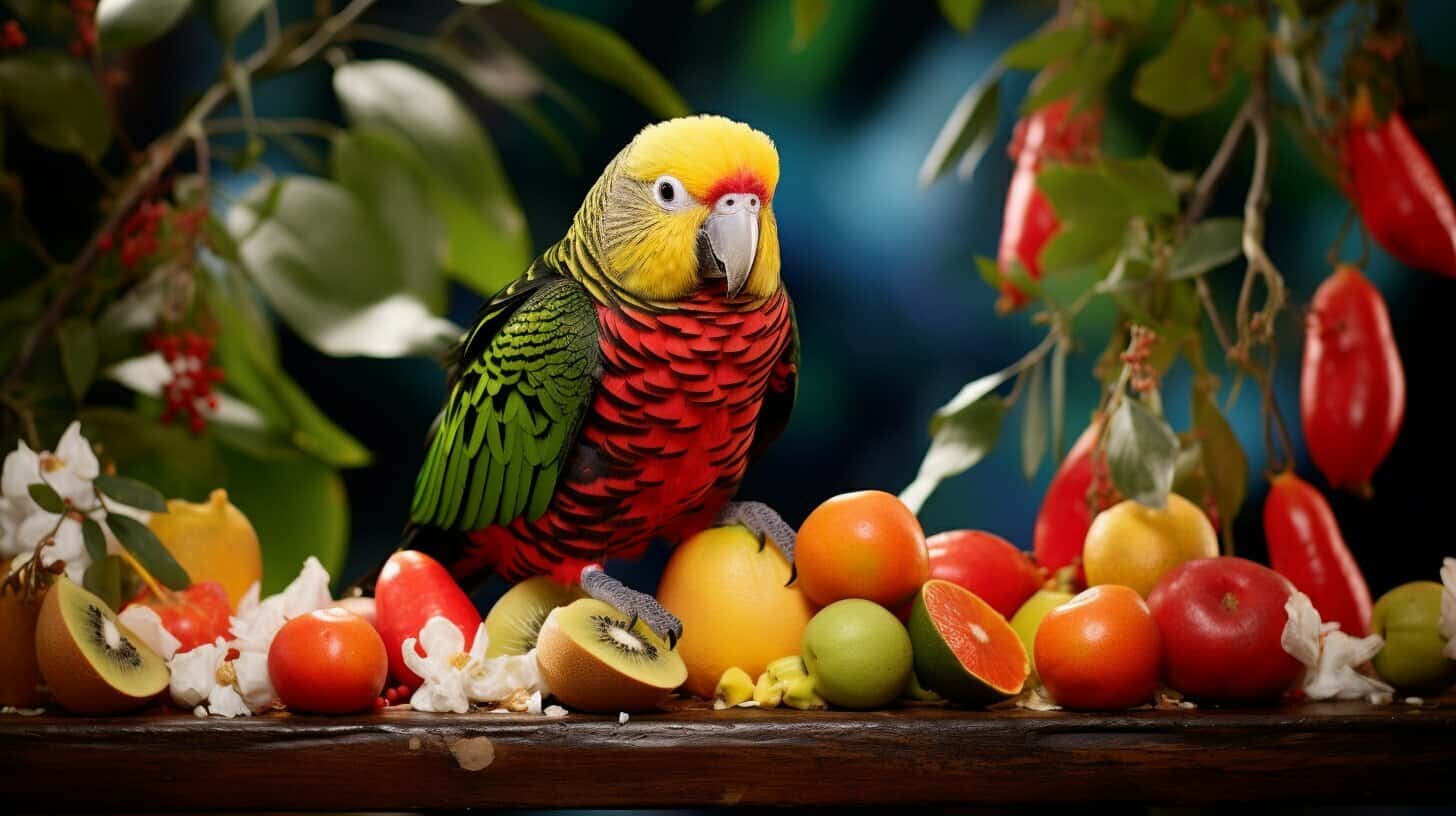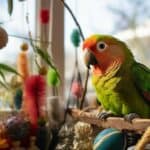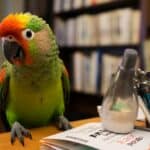When feeding your Kakarikis, knowing which fruits are safe and beneficial for their health is essential. These exotic pets thrive on a varied and nutritious diet, which includes a selection of fruits and vegetables. By understanding what fruit can Kakarikis eat, you can provide them with essential vitamins and minerals, while adding a touch of sweetness to their diet.
Key Takeaways:
- Kakarikis can enjoy various fruits, including grapes, oranges, kiwi, apples, strawberries, and pears.
- It is important to ensure that your fruits are free from pesticides and chemicals.
- Avoid giving Kakarikis too much sugar, as it can harm their health.
- In addition to fruits, they also enjoy dry and sprouted seeds, which can be included in their diet.
- They have a penchant for wild foods, such as seeding grasses, dandelion leaves, and smooth sow-thistle.
By providing a balanced diet that includes a mix of fruits, vegetables, and other food options such as dry and sprouted seeds, you can ensure that your Kakarikis are getting the nutrients they need to thrive. Don’t forget to offer them fresh water for bathing and to keep their aviary safe and secure for their well-being.
Kakarikis’ Fruit Preferences
Kakarikis have certain fruit preferences, and by understanding them, you can provide a varied and enjoyable diet for your feathered friend. These vibrant parrots are known for their love of fruits, and incorporating a range of options into their diet can help keep them healthy and satisfied.
Regarding suitable fruits for Kakarikis, grapes are a definite favourite. Not only are they sweet and juicy, but they also offer a good source of hydration. It’s important to choose organic grapes to ensure they are free from harmful pesticides and chemicals. Remember to offer them in moderation, as too much sugar can harm their health.
In addition to grapes, Kakarikis also enjoy citrus fruits like oranges. Bursting with vitamin C, oranges provide an immune system boost for your feathered friend. However, feeding them in moderation is essential due to their acidity. Remove the seeds and offer small slices as occasional treats.
| Fruit | Nutritional Benefits |
|---|---|
| Grapes | Hydrating and packed with antioxidants |
| Oranges | Rich in vitamin C for a healthy immune system |
Kiwi is another tropical delight that Kakarikis enjoy. It is high in vitamins and minerals, promoting a strong immune system and overall well-being. Offer small, diced pieces for your bird to enjoy.
Apples are also a popular choice among Kakarikis. They provide a satisfying crunch and are a good source of fibre. Remember to remove the seeds, as they can be toxic to birds.
Consider strawberries and pears if you want to add variety to your Kakariki’s fruit diet. These fruits are sweet, juicy, and high in water content, offering a refreshing treat for your feathered friend. Remember to offer them in moderation to avoid excessive sugar intake.
Remember, providing a balanced diet for your Kakariki is crucial. Alongside fruits, offer a good quality parakeet mixture and consider incorporating dry and sprouted seeds. Additionally, Kakarikis enjoy wild foods such as seeding grasses and the young leaves of dandelion and smooth sow-thistle. Ensure they have access to fresh water for bathing and keep their aviary safe and secure.
Grapes: A Sweet Treat for Kakarikis
Grapes are a delicious and safe fruit that can be included in your Kakariki’s diet, providing them with essential vitamins and antioxidants. These juicy fruits are a tasty treat and offer several health benefits for your feathered friend.
One of the main advantages of feeding grapes to Kakarikis is their high water content, which helps keep them hydrated. Additionally, grapes are rich in vitamins, such as C and K, vital for maintaining a healthy immune system and promoting blood clotting.
When offering grapes to your Kakariki, it is important to choose organic varieties to avoid exposing your pet to harmful pesticides or chemicals. Remove any seeds, as they can be a choking hazard for birds. As with any fruit, moderation is key, as grapes contain natural sugars. Limit the grapes you provide to ensure a well-balanced diet for your Kakariki.
| Benefits of Grapes for Kakarikis | |
|---|---|
| Hydration | The high water content in grapes helps keep Kakarikis hydrated. |
| Immune System Support | Grapes are rich in vitamin C, which boosts the immune system and helps fight off infections. |
| Healthy Blood Clotting | The vitamin K found in grapes promotes proper blood clotting, preventing excessive bleeding. |
| Antioxidants | Grapes contain antioxidants that protect your Kakariki’s cells from damage caused by harmful free radicals. |
Offering grapes as a treat to your Kakariki can be a great way to provide them with some variety in their diet. Remember to consult with a veterinarian or avian specialist to ensure that your Kakariki’s dietary needs are met and that they receive a well-rounded nutrition plan.
Oranges: Bursting with Vitamin C
Oranges are a fantastic source of vitamin C and can be a refreshing addition to your Kakariki’s diet, but remember to offer them in moderation. These vibrant fruits provide a burst of tangy flavour and pack a powerful punch of essential nutrients. Vitamin C boosts your feathered friend’s immune system, promoting overall health and well-being.
When feeding oranges to your Kakariki, remove all seeds and peel off the skin, as they can be difficult to digest. Offer small, bite-sized pieces to prevent choking hazards, and observe their intake to ensure they don’t consume too much sugar, which can harm their health.
In addition to their high vitamin C content, oranges contain dietary fibre, aiding digestion and promoting a healthy gut. A varied diet that includes oranges, along with other safe and nutritious fruits, will contribute to the overall well-being of your Kakariki.
| Benefits of Oranges for Kakarikis |
|---|
| High vitamin C content strengthens the immune system |
| Dietary fiber aids digestion and promotes a healthy gut |
| Refreshing and hydrating fruit option |
Remember to offer a balanced diet that includes a variety of safe fruits and vegetables, dry and sprouted seeds and a good quality parakeet mixture. Kakarikis enjoy wild foods such as seeding grasses, dandelion leaves, and smooth sow-thistle. Fresh water for bathing and a safe and secure aviary are essential for their overall well-being.
Kiwi: A Tropical Delight
Kiwi is a tropical fruit that can bring a taste of paradise to your Kakariki’s diet while providing them with essential nutrients. These vibrant green fruits contain vitamins, minerals, and antioxidants, making them a great addition to your feathered friend’s menu.
Rich in vitamin C, kiwi can help boost your Kakariki’s immune system, keeping them healthy and happy. It also contains potassium, which promotes strong muscles and proper heart function. Additionally, kiwi is a good source of dietary fiber, aiding in digestion and maintaining a healthy weight.
To introduce kiwi to your Kakariki’s diet, peel the fruit and cut it into small, manageable pieces. You can offer it as a treat or mix it with other fruits for a refreshing fruit salad. Remember to remove any seeds, as they can be a choking hazard.
| Benefits of Kiwi for Kakarikis: |
|---|
| High vitamin C content |
| Good source of potassium |
| Dietary fiber for digestion |
While kiwi is a nutritious addition to your Kakariki’s diet, it’s important to offer it in moderation. Too much fruit can lead to an imbalanced diet, as Kakarikis also require a variety of vegetables, seeds, and other foods for optimal nutrition. Additionally, always ensure that the fruits you provide are free from pesticides and chemicals, as these can harm your feathered friend’s health.
You can provide a healthy and varied menu by incorporating kiwi and other suitable fruits into your Kakariki’s diet. Remember to consult your avian veterinarian to determine the best diet plan for your specific bird, as individual nutritional needs may vary. You can keep your Kakariki happy, healthy, and thriving with the right balance of fruits, vegetables, and other food options.
Apples: Crunchy and Nutritious
Apples are a popular choice for Kakarikis, offering a satisfying crunch and a range of nutrients contributing to their overall well-being. These vibrant fruits are packed with vitamins, minerals, and antioxidants, making them a nutritious addition to their diet.
One of the key benefits of feeding apples to Kakarikis is their high fibre content. Fiber promotes healthy digestion and helps prevent common digestive problems in these exotic birds. It also aids in maintaining a healthy weight, which is important for their overall health and longevity.
When offering apples to Kakarikis, it is important to remove the seeds as they contain trace amounts of cyanide, which can harm birds. Additionally, offering organic apples to avoid exposing them to harmful pesticides and chemicals is recommended.
Incorporating apples into a varied diet for Kakarikis can provide them with essential vitamins like vitamin C, which supports a strong immune system, and vitamin A, which promotes good vision and healthy feathers. Including apples in their fruit rotation alongside other suitable options will help ensure they receive a balanced and nutritious diet.
| Benefits of Apples for Kakarikis: |
|---|
| High fiber content aids in digestion |
| Rich in vitamins and antioxidants |
| Supports a strong immune system |
| Promotes healthy weight maintenance |
| Ensure seeds are removed to prevent cyanide exposure |
Strawberries and Pears: Sweet and Juicy
Strawberries and pears make a sweet and juicy addition to your Kakariki’s diet, providing hydration and a burst of flavour they’ll love. These fruits are delicious and packed with beneficial nutrients that can contribute to your pet’s overall health and well-being.
Strawberries, with their vibrant red colour and natural sweetness, are rich in antioxidants and vitamin C. They can help boost your Kakariki’s immune system and protect against cellular damage. On the other hand, Pears offer a refreshing and juicy treat high in fibre and water content. They can promote healthy digestion and hydration, essential for optimal health.
When incorporating strawberries and pears into your Kakariki’s diet, it is important to remember moderation. While these fruits are safe and suitable for Kakariki parrots, they should be offered in appropriate portions for a balanced diet. Too much fruit can lead to excessive sugar intake, which may contribute to health issues in the long run.
As with any fruit, it is crucial to select organic options to ensure that your Kakariki is not exposed to harmful pesticides and chemicals. Wash the fruits thoroughly before offering them to your feathered friend, removing any stems or seeds that may pose a choking hazard. By providing a variety of fruits like strawberries and pears, along with other nutritious options, you can create a diverse and nutritious diet that will keep your Kakariki happy and healthy.
| Fruit | Nutritional Benefits |
|---|---|
| Strawberries | High in antioxidants Rich in vitamin C Supports immune system |
| Pears | High water content Good source of fiber Promotes healthy digestion |
Balancing the Diet and Other Food Options
While fruits are a great addition to your Kakariki’s diet, ensuring they are part of a well-balanced feeding regime that includes other food options is crucial. Variety is key to providing your feathered friend with the nutrients for optimal health and well-being. Alongside fruits, vegetables play an important role in their diet, providing essential vitamins, minerals, and dietary fibre.
| Fruits | Vegetables |
|---|---|
| Grapes | Carrots |
| Oranges | Broccoli |
| Kiwi | Spinach |
| Apples | Pumpkin |
| Strawberries | Cucumber |
| Pears | Peppers |
In addition to fruits and vegetables, Kakarikis enjoy dry and sprouted seeds. These can be included in their diet to provide additional nutrients and variety. A good parakeet mixture can be a convenient option as it often contains a balanced combination of seeds, grains, and pellets. However, it’s important to monitor the quantity of seeds and ensure it does not become the sole source of nutrition.
Furthermore, incorporating wild foods into their diet can provide natural enrichment. Seeding grasses and the young leaves of dandelion and smooth sow-thistle are particularly enjoyed by Kakarikis. These foods offer a variety of textures and flavours, as well as natural foraging opportunities.
Safe and Secure
While focusing on a balanced diet, it is equally important to provide your Kakariki with a safe and secure environment. Ensure their aviary is free from hazards like toxic plants or sharp objects. Additionally, fresh water should be available for drinking and bathing, as Kakarikis love splashing around and keeping their feathers clean. Regularly monitor their diet and behaviour to ensure they are thriving, and consult with a veterinarian for any specific dietary recommendations.
Wild Foods for Kakarikis
In their natural habitat, Kakarikis have access to various wild foods that contribute to their overall health and well-being. These foods provide essential nutrients and enrichment for these vibrant birds. It’s important to mimic their natural diet as closely as possible when caring for Kakarikis in captivity.
One of the wild foods that Kakarikis enjoy is seeding grasses. These grasses provide a good source of fiber, which aids in digestion and helps maintain a healthy weight. Additionally, Kakarikis relish the young leaves of dandelion and smooth sow-thistle. These leafy greens contain vitamins and minerals, promoting a strong immune system and vibrant plumage.
| Natural Foods for Kakarikis | Nutritional Benefits |
|---|---|
| Seeding Grasses | High in fiber, aids digestion |
| Dandelion Leaves | Rich in vitamins and minerals |
| Smooth Sow-Thistle | Promotes a strong immune system |
When introducing wild foods into a Kakariki’s diet, it’s essential to ensure they are free from pesticides and chemicals. It’s best to collect these foods from areas known to be pollution-free, such as organic gardens. Thoroughly wash and inspect the wild foods before offering them to your feathered friend.
Remember, while wild foods are a beneficial addition to a Kakariki’s diet, it’s crucial to provide a balanced diet that includes various fruits and vegetables. Fresh water for bathing should be readily available, and the aviary should be safe and secure to protect these playful and curious birds.
Conclusion
By understanding Kakarikis’ fruit preferences and nutritional needs, you can ensure they receive a healthy and enjoyable diet that promotes their overall well-being. These colourful parrots can enjoy a variety of fruits, including grapes, oranges, kiwi, apples, strawberries, and pears. However, choosing organic fruits free from pesticides and chemicals is essential to protect their health.
While fruits are a delicious treat for Kakarikis, it is crucial to offer them in moderation. Too much sugar can harm their health, so limiting the amount of fruit they consume is best. In addition to fruits, Kakarikis also have other dietary needs. They enjoy dry and sprouted seeds and can be fed a high-quality parakeet mixture to ensure they receive a balanced diet.
Kakarikis also indulge in natural foods such as seeding grasses and the young leaves of dandelions and smooth sow-thistles in the wild. Incorporating these wild foods into their captive diet can provide additional nutritional benefits. It is essential to provide fresh water for bathing and ensure the aviary is safe and secure to create a conducive environment for their well-being.
By following these guidelines and offering a varied and nutritious diet, you can keep your Kakarikis happy and healthy. Remember to consult with a veterinarian or avian expert to ensure you are meeting their specific dietary needs. Your Kakarikis will thrive and bring you joy for years with proper care and attention.
FAQ
Q: What fruits can Kakarikis eat?
A: Kakarikis can eat various fruits, including grapes, oranges, kiwi, apples, strawberries, and pears.
Q: Are there any fruits that Kakarikis should avoid?
A: Kakarikis should not be given too much sugar, so it’s important to avoid feeding them fruits with a high sugar content.
Q: Can Kakarikis eat fruits with pesticides?
A: It is important to ensure that the fruits given to Kakarikis are free from pesticides and chemicals. Opt for organic options to ensure their safety.
Q: Is it necessary to remove apple seeds before giving them to Kakarikis?
A: Yes, it is important to remove apple seeds as they contain small amounts of cyanide, which can be harmful to Kakarikis.
Q: Can Kakarikis eat wild foods?
A: Kakarikis enjoy eating wild foods such as seeding grasses and the young leaves of dandelion and smooth sow-thistle.
Q: What other food options can be included in a Kakariki’s diet?
A: In addition to fruits, Kakarikis can also be fed a good quality parakeet mixture, dry and sprouted seeds, and a variety of vegetables to ensure a balanced diet.
Q: What should be provided to Kakarikis in terms of water and environment?
A: Fresh water for bathing is essential for Kakarikis. Additionally, it is vital to ensure the aviary is safe and secure to protect them from potential harm.



Have comments or questions about this article? Then get involved!
Spotted an error or something we have missed? Let us know